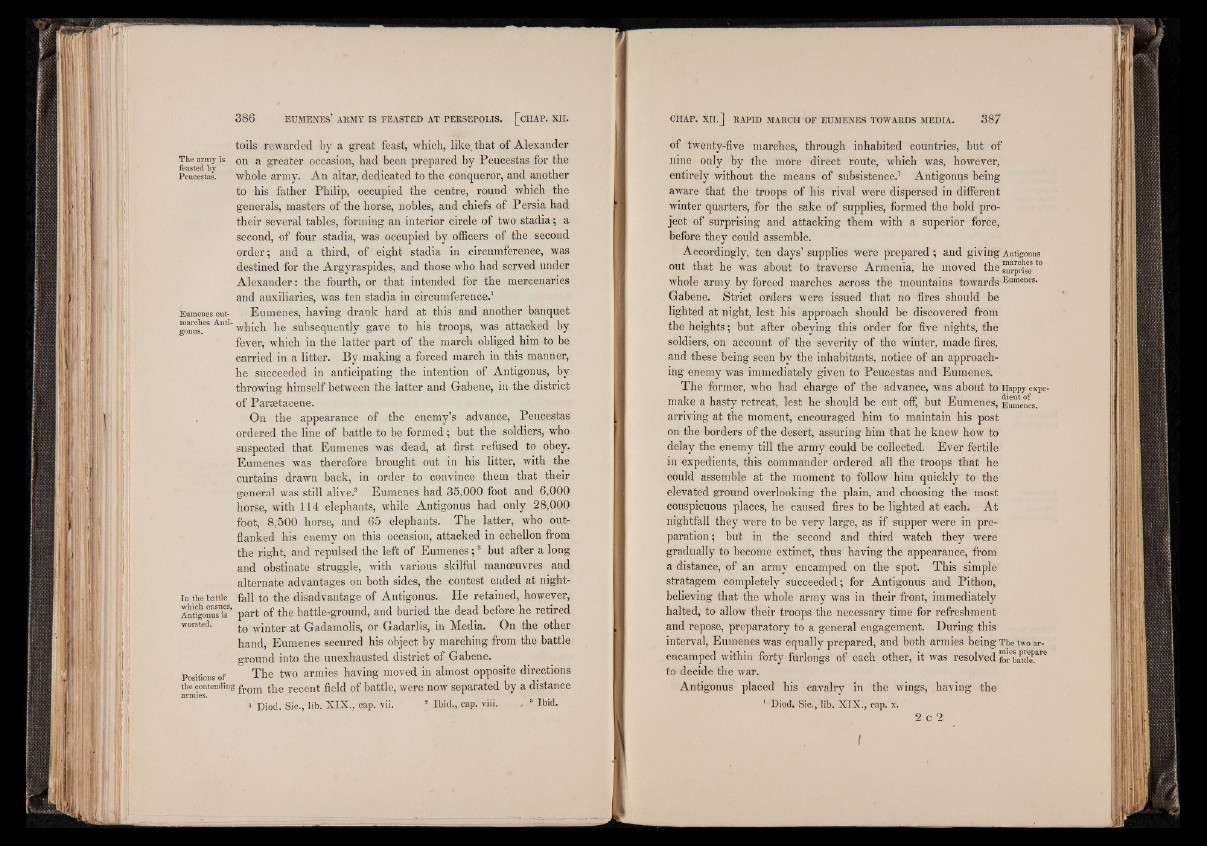
toils rewarded by a great feast, which, like, that of Alexander
The army is 0n a greater occasion, had been prepared by Peucestas for the
Peucestas. whole army. An altar, dedicated to the conqueror, and another
to his father Philip, occupied the centre, round which the
generals, masters of the horse, nobles, and chiefs of Persia had
their several tables, forming an interior circle of two stadia ; a
second, of four stadia, was occupied by officers of the second
order; and a third, of eight stadia in circumference, was
destined for the Argyraspides, and those who had served under
Alexander: the fourth, or that intended for the mercenaries
and auxiliaries, was ten stadia in circumference.1
Eumenes out- Eumenes, having drank hard at this and another banquet
gonus!68 Antl_ which he subsequently gave to his troops, was attacked by
fever, which in the latter part of the march obliged him to be
carried in a litter. By making a forced march in this manner,
he succeeded in anticipating the intention of Antigonus, by
throwing himself between the latter and Gabene, in the district
of Parætacene.
On the appearance of the enemy’s advance, Peucestas
ordered the line of battle to be formed ; but the .soldiers* who
suspected that Eumenes was dead, at first refused to obey.
Eumenes was therefore brought out in his litter, with the
curtains drawn back, in order to convince them that their
general was still alive.2 Eumenes had 35,000 foot and 6,000
horse, with 114 elephants, while Antigonus had only 28,000
foot, 8,500 horse, and 65 elephants. The latter, who outflanked
his enemy on this occasion, attacked in echellon from
the right, and repulsed the left of Eumenes ; 3 but after a long
and obstinate struggle, with various skilful manoeuvres and
alternate advantages on both sides, the contest ended at night-
in the battle fall to the disadvantage of Antigonus. He retained, however,
IntigotmsTsS’ part of the battle-ground, and buried the dead before he retired
■worsted. w;n^er aj; Gadamolis, or Gadarlis, in Media. On the other
hand, Eumenes secured his object by marching from the battle
ground into the unexhausted district of Gabene.
Positions of The two armies having moved in almost opposite directions
the contending from recent field of battle, armies. were now separated by a distance
1 Diod. Sic., lib. X IX ., cap. vii. 2 Ibid., cap. viii. , 8 Ibid.
of twenty-five marches, through inhabited countries, but of
nine only by the more direct route, which was, however,
entirely without the means of subsistence.1 Antigonus being
aware that the troops of his rival were dispersed in different
winter quarters, for the sake of supplies, formed the bold project
of surprising and attacking them with a superior force,
before they could assemble.
Accordingly, ten days’ supplies were prepared ; and giving Antigonus
out that he was about to traverse Armenia, he moved the mrprise *°
whole army by forced marches across the mountains towards Eumenes-
Gabene. Strict orders were issued that no fires should be
lighted at night, lest his approach should be discovered from
the heights; but after obeying this order for five nights, the
soldiers, on account of the severity of the winter, made fires,
and these being seen by the inhabitants, notice of an approaching
enemy was immediately given to Peucestas and Eumenes.
The former, who had charge of the advance, was about to Happy expe-
make a hasty retreat, lest he should be cuti off, but Eumenes, Eumenes.
arriving at the moment, encouraged him to maintain his post
on the borders of the desert, assuring him that he knew how to
delay the enemy till the army could be collected. Ever fertile
in expedients, this commander ordered all the troops that he
could assemble at the moment to follow him quickly to the
elevated ground overlooking the plain, and choosing the most
conspicuous places, he caused fires to be lighted at each. At
nightfall they were to be very large, as if supper were in preparation
; but in the second and third watch they were
gradually to become extinct, thus having the appearance, from
a distance, of an army encamped on the spot. This simple
stratagem completely succeeded; for Antigonus and Pithon,
believing that the whole army was in their front, immediately
halted, to allow their troops the necessary time for refreshment
and repose, preparatory to a general engagement. During this
interval, Eumenes was equally prepared, and both armies being The two ar-
encamped within forty furlongs of each other, it was resolved for1LPttiefre
to decide the war.
Antigonus placed his cavalry in the wings, having the
1 Diod. Sic., lib. X IX ., cap. x,
2 C 2